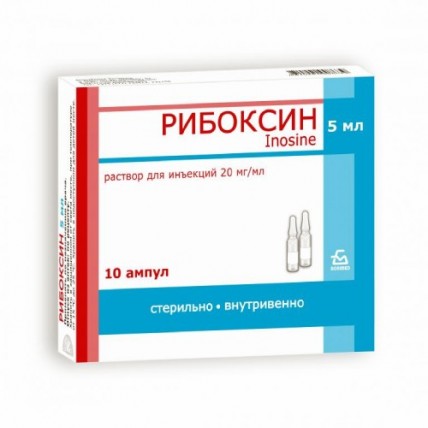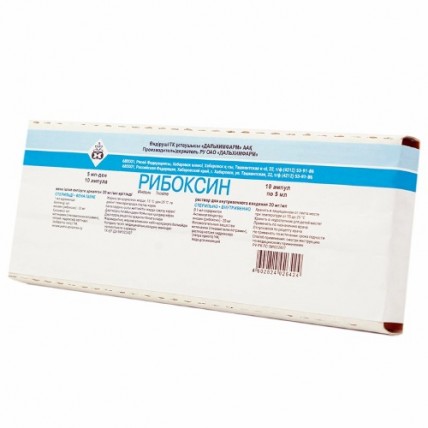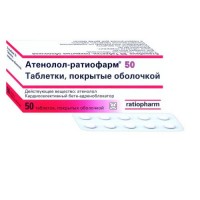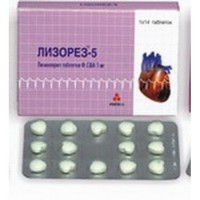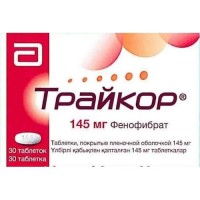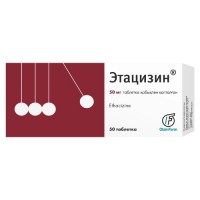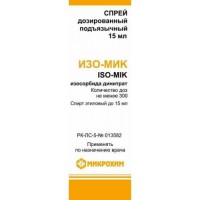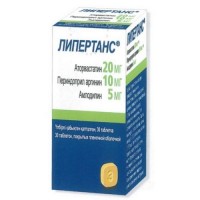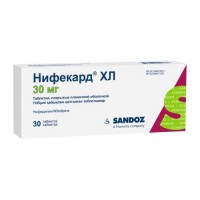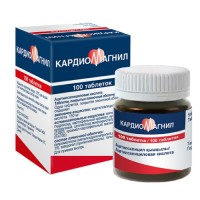Riboxin (Inosine) 20 mg/ml, 5 ml x 10 ampoules
- $11.00
What is Riboxin (Inosine) 20 mg/ml?
Riboxin, also known as Inosine, is a cardiovascular medication used primarily in the treatment of heart conditions.
It comes in the form of an intravenous solution with a concentration of 20 mg/ml, and is available in ampoules, with each containing 5 ml of the solution.
Riboxin is often used as part of a comprehensive treatment plan for conditions such as myocardial infarction (heart attack), coronary heart disease, and certain arrhythmias.
Additionally, it can be used in the treatment of liver diseases like hepatitis, cirrhosis, and fatty liver disease, and in surgeries involving isolated kidneys.
How is Riboxin Used?
Riboxin is administered intravenously, either slowly as a jet injection or as a drip infusion. The treatment typically starts with a dose of 200 mg (10 ml) once a day, and if well tolerated, the dosage can be increased to 400 mg (20 ml) once or twice a day. The usual duration of treatment ranges from 10 to 15 days.
For acute heart rhythm disturbances, a single dose of 200-400 mg may be administered. In surgeries to protect kidneys from ischemia, 1.2 g (60 ml) is injected 5-15 minutes before the clamping of the renal artery, followed by an additional 0.8 g (40 ml) after blood circulation is restored. When given as a drip infusion, the solution is diluted in 5% dextrose or isotonic sodium chloride solution up to 250 ml.
What Should You Know Before Using Riboxin?
Contraindications
Riboxin should not be used if you have any of the following conditions:
- Hypersensitivity to the medication
- Gout
- Hyperuricemia (high levels of uric acid in the blood)
- Kidney failure
- Pregnancy or breastfeeding
- Under 18 years of age
Drug Interactions
Riboxin can enhance the effects of anabolic steroids and non-steroidal anabolic agents. However, it may reduce the bronchodilatory effect of theophylline and the stimulating effects of caffeine. When used with beta-blockers, Riboxin's effects are not diminished. Additionally, it may prevent arrhythmias and enhance the effects of cardiac glycosides.
Special Warnings
Long-term use of Riboxin may exacerbate gout, so monitoring uric acid levels is recommended. It is not suitable for emergency treatment of heart conditions. If you experience itching or skin redness, discontinue use immediately. Caution is advised when using Riboxin in patients with kidney issues, and it should be avoided in cases of leukopenia, where the white blood cell count is low.
How Should Riboxin Be Stored?
Riboxin should be stored in a place protected from light, at a temperature between 15°C and 25°C (59°F to 77°F).
Keep it out of reach of children, and do not use it after the expiration date, which is three years from the manufacturing date.
What Are the Possible Side Effects of Riboxin?
Possible side effects include:
- Allergic or anaphylactic reactions, such as rash, itching, skin redness, hives, and in rare cases, anaphylactic shock.
- Lipodystrophy
- Tachycardia (rapid heartbeat)
- Low blood pressure, which may cause headache, dizziness, nausea, vomiting, and sweating.
- In rare cases, increased uric acid levels in the blood, potentially leading to a gout flare-up with prolonged use.
What Should You Do in Case of an Overdose?
While there have been no reported cases of Riboxin overdose, high doses may cause nausea, stomach pain, and heart rhythm disturbances in patients with kidney dysfunction. If an overdose is suspected, discontinue use and seek symptomatic treatment. There is no specific antidote for Riboxin overdose, but sodium caffeine-benzoate may be administered subcutaneously if necessary.
